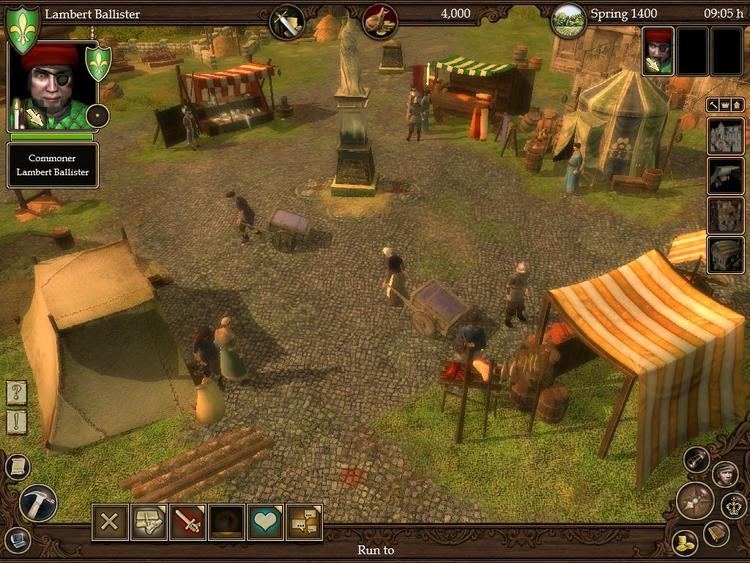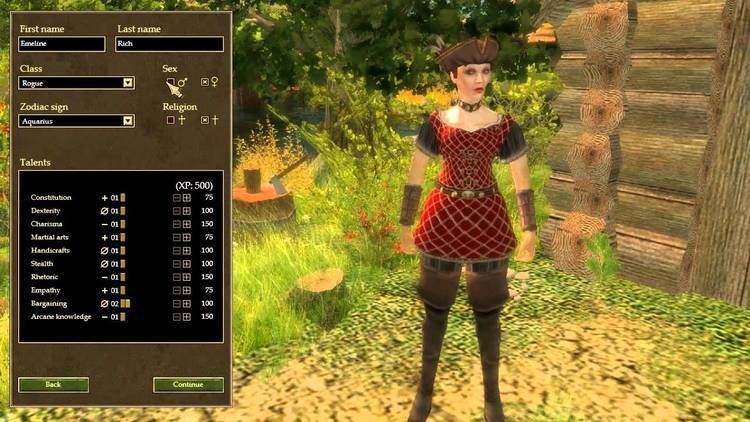6.2 /10 1 Votes
61% Metacritic Distributor(s) JoWooD Entertainment Producer(s) Tobias Severin Genre Life simulation game | 6/10 Steam 6.2/10 GameSpot Director(s) Ulrich Haar Initial release date 15 September 2006 Series The Guild Developer Cranberry Production | |||||||||||||||||||||||||||||||||
 | ||||||||||||||||||||||||||||||||||
Publisher(s) JoWooD EntertainmentDeep Silver Designer(s) Lead DesignerLars Martensen Thomas FischerPaul KammaHeinrich MeyerTobias Severin Programmer(s) Stefan DilgerLukas HenschkeUwe HoepnerMatthias Meyer Similar JoWooD Entertainment games, Strategy video games | ||||||||||||||||||||||||||||||||||
lp narratif the guild 2 episode 3 passage de flambeau
The Guild 2 is a historical multiplayer real-time strategy video game developed by 4HEAD Studios and published by JoWooD Entertainment. It is the second installment in the historical real-time strategy video game series, following Europa 1400. The Guild 2 was released September 29, 2006, for PCs. The game uses the gamebryo engine.
Contents
- lp narratif the guild 2 episode 3 passage de flambeau
- The guild 2 renaissance part 4 2017
- Gameplay
- Professions
- Titles
- Politics
- Dynasty
- Real time economics
- Setting
- Development
- Reception
- Expansions
- References

In Guild 2's main story, the player creates a character who runs a business in a medieval world, eventually gets married and starts a dynasty; and attempts to outplay or eliminate the other computer-controlled dynasties in the single player mode, or against other players online in the multiplayer mode.

The guild 2 renaissance part 4 2017
Gameplay

The Guild 2 is a combination life simulator and economic strategy game that is set in Europe, beginning in the year 1400. The player creates a character who becomes the founding member of a "dynasty," and, based on their chosen profession (also referred to as character class), may purchase, build, and take over various businesses. The game incorporates the following modes:


All game modes can be played in varying difficulties ranging from easy to hard, chosen by a slider on the game creation screen.
Professions
There are four main professions that the player may choose for the first member of the dynasty:

Titles
The player's character(s) may go to the town hall of the town that they start in and purchase new titles, which confer different benefits. The title progression is linear, beginning with "Commoner" and proceeding through "Citizen," "Patrician," and then to titles of nobility such as "Baron."
With the titles come privileges that may allow the character to perform political acts like applying for public office and owning more businesses. A higher title also allows characters to improve and upgrade their homes.
Politics
Along with their purchased titles, characters may also run for public office by visiting the town hall and choosing the office they wish to run for. The offices include positions such as "bishop" and "executioner," as well as more powerful positions such as "Marshal," who may control the guards in a city, to "King," who will make whatever decisions they wish.
New positions in government are created in new cities as they grow. Cities grow from villages to "Imperial Capitals" as they gain more population.
Dynasty
The player begins with one dynasty member, and may court a member of the opposite sex. This can lead to marriage, which will allow the married couple to produce children who will carry on the dynasty after the original character's death. Only three members of the dynasty can be under the player's direct control at any given time. Dynasty members that are not under the player's control wander around the game world.
Children of the dynasty can be sent to school at age 8, to an apprenticeship at age 12, and can finally become fully controllable by the player at age 16, provided they are added to the player's group. At this point, they may be assigned as owners of their own home in the city of the player's choosing.
A dynasty is ended by its last member's death.
Real-time economics
The economic simulation of the game is based on the laws of supply and demand. In the city markets, a dearth of a given good will cause the value of that particular good to rise. Selling a great deal of a single good at the market will conversely decrease the value of the good.
Since the manufacturing businesses require raw materials to function, some players may find themselves relying on the city's open market for raw materials. In order to avoid this kind of situation, the player may choose to marry their character to a spouse that has a complementary profession. For example, a Crafts(wo)man with a Weaving Mill may decide to marry a Patron that has a sheep farm. Since the dynasty now contains both a Crafts(wo)man and a Patron, the player may build their own farms to raise sheep, whose wool may then be sent to the Weaving Mill to be turned into cloth.
Setting
The Guild 2 takes place during the year 1400, the same year like its predecessor in a medieval atmosphere, after the events of The Guild, making this installment chronologically the second in the series. The game is set in the Middle Ages, in historical regions of Swabia, at the River Neckar and in a valley near the Odenwald.
Development
Development for The Guild 2 began in early 2006, four years after Europa 1400, which was published in 2002 and is characterized mainly by the increased importance of the private life of the individual figures.
And add-on, Guild 2: Pirates of the Seas, added new features such as a hospital and a fishery. On August 31, 2007, The Guild 2 Gold was released, which includes the main game and Pirates of the Seas. All previously published titles in the series, so The Guild and The Guild 2 add-ons with each, were placed under the name of The Guild Universe in July 2008 in the trade.
The Guild 2: The Royal Edition appeared on July 25, 2008. It contains The Guild 2, the add-on Pirates of the Seas, new maps and patch 2.1.
A stand-alone expansion called The Guild 2: Venice was released on October 10, 2008. It includes the city of Venice, a new building style, and some minor new features.
Reception
The Guild 2 generally received mixed reviews from critics. It has a 62% score on GameRankings and a 61/100 from Metacritic.
The game received a C+ rating from 1UP.com, and a 6.2 out of 10 points from GameSpot. VideoGamer.com gave the game 4 out 10. X-Play gave the game 3 out of 5. Strategy Informer gave the game 7.1 out of 10. The tester from GameStats gave the game 7 out of 10. IGN rated it a 6.5 out of 10, and GameZone gave the game 7.1 out of 10 points, Allgame rated it 3 out of 5. Hooked Gamers gave it 5 out of 10.
The Guild 2 Renaissance was awarded the Sound Award by PC Games magazine.
Expansions
After initial logistical delays, the first expansion pack named Pirates of The European Seas was released in May 2007. This stand alone expansion pack added several features such as new professions and several different types of ships. This first expansion pack met with slightly better reviews than the original game. GameSpot gave it a "fair" score (6/10), and Strategy Informer a score of 8.2 out of 10.
A stand-alone expansion for the game called The Guild 2 - Venice developed by Trine Games was published at the end of 2008. This expansion, which added the city of Venice to the game world, was received poorly by critics, having an average rating of 49% on Metacritic.
A stand-alone expanded version, entitled The Guild 2: Renaissance was released by Runeforge Game Studio and JoWooD Entertainment on July 27, 2010. It includes previous expansions.
On August 25, 2014, Nordic Games announced the new patch 4.2 for The Guild 2 Renaissance. It will fix a lot of map bugs, add some scenarios and remaster the audio track for the game.
During gamescom 2014 Nordic Games announced that they are developing The Guild 3.
